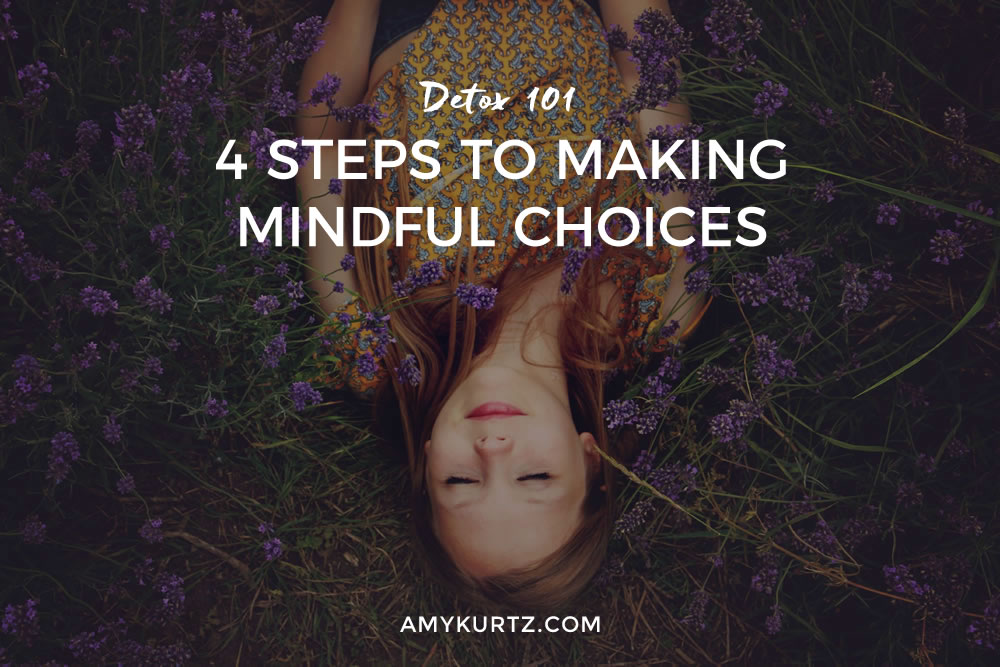In the first post of this series we did an overview of daily detoxification, and why it’s important to keeping you healthy and happy.
Now, let’s take a deeper dive into the practices and routines that help you achieve your optimal wellbeing, both physically and metaphysically. These first four steps towards detoxifying your life and making lasting changes towards health and harmony in your body and mind and soul. We’ll take them one by one.
The best place to start when making positive, lifelong changes is definitely in the mind. What you believe you achieve. Sometimes it really is “all in your head,” and taking a mindful approach to your life will make you aware of the distractions that stress you and prevent you from good self-care. De-stressing your life through meditation, visualization, and other contemplative practices helps guide you to a place of inner peace. First, you must clear your mind so that you can listen to your body with understanding.
The Four Steps
1. Take Five
A morning news program once advertised itself as “breakfast for your head.” Intentional or not, this phrase is, in fact, excellent advice. Before your feet hit the floor in the morning take five minutes for “you time”: Put your phone on airplane mode, sit up, shut your eyes, and practice deep breathing. If the breathing seems like it isn’t enough you can add a simple mantra.
For example, you can say “I am” on the inhale and “healthy” on the exhale. At the end of the allotted amount of time, say at least five things you are grateful for. Starting the day on a positive note, with an attitude of gratitude, nourishes your mental state and automatically shifts your energy to enhance the way you take on the day.
2. Make You a Priority
The next challenge is to maintain your sense of optimism and serenity throughout the day. Having alone time and doing things that truly make you happy at your core will automatically make you more aware of the things that make you happy and the things that do not. Given the busy lives we lead, you may think this is easier said than done. And, in the beginning, as you are learning new habits, you may be right. Don’t despair or give up. Practice and repetition lead to a habit, and it takes 21 days to make a good habit or break a bad one.
Schedule something for yourself every day, even if it is just a short time; for example, sign up for a workout class you love, read your horoscope, or take a 20- minute walk while you listen to music you that makes you feel happy. Whatever it is, schedule it in. These little “just for you” moments will start to affect your connection to yourself.
3. You are More than Your Work
This may be the hardest one of all. Learn to clear your mind of work. Even if you love your job, and are passionate about the work you do, you nevertheless need to know when—and how—to set it aside. No one has the mental stamina to be on the job 24/7. It’s not healthy for you, and, in reality, it ensures you won’t be doing what you do with peak performance. Even if you must take work home with you, try not to make this an everyday practice, and do confine your “homework” to a small space within your home.
The best way to make certain you are fresh and alert for new challenges, though, is to make sure that everything is done for the day before you leave work and come home. That can mean, returning the last few phone calls, finishing up emails, or just simply making a “to do” list for the next day. Doing these end-of-day tasks routinely and energetically lets you transition to a more calm and present state of being, so that when you arrive at your front door at the end of the day, you can say, “I leave all stress from work here.” This helps you see your home as your place of serenity and peace, what I call your “Zen den.”
4. Wind Down when Day is Done
I don’t know about you, but if I don’t get a full eight hours a night I am the meanest version of me there is. I comically refer to myself as “a bear”—if you wake me before I am ready, beware! Seriously though, to be our best selves we need about eight hours of fully restful sleep daily. There definitely are things we can incorporate into our nighttime routine to help us sleep more soundly and more restfully so that when morning comes there are no bears in sight.
Did you know that by dimming the lights you are sending a signal your body interprets as “go to bed”? So, if you light some fragrant candles, put on some relaxing music, and turn off all but the most subtle light, you will set your body up for deep sleep. Turn off all electronics a few hours before bed: playing one more computer game or posting on Facebook from bed actively inhibits your mind from letting you fall asleep.
In addition, I find that putting a few drops of lavender essential oil on my temples before I turn in is really calming. Lavender oil is one of those folk remedies for insomnia that science has proven really works. I also use it in my evening bath along with a few cups of Epsom salts, inexpensive yet very soothing to the body. My nightly soak calms me down and gives me time for myself before I go into slumber.
Once you start practicing simple but effective tools for how to always check in to your body (your house) you will be more aware of how you feel and how you want to feel. Your body is your temple—and it is the only place you have to live—so let’s start treating it with attention and respect.



Love ❤️ Love, Love subscribing and adding to my home page!
So happy you found it valuable <3